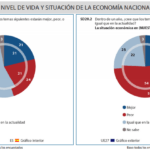After uneployment in the EU had steadily increased since 2013, the Covid-19 pandemic led to a rise in 2020. Find out how the EU works to reduce unemployment and fight poverty.
Although EU labour market conditions and workers’ rights have significantly improved in recent years, the fight against unemployment and the consequences of the Covid crisis remain challenges for the European Union owhile working towards quality jobs and a socially inclusive Europe.
Find out more about how the EU protects jobs and workers affected by the coronavirus pandemic
Efforts have been made in a number of areas, including helping young people enter the labour market, combating long-term unemployment, upgrading skills, and facilitating workers’ mobility in the EU.
EU unemployment rate
In April 2021, the unemployment rate in the euro zone was 8%, down from 8.1 % in March 2021 and up from 7.3 % in April 2020.
EU vs member state competencies
EU countries are still primarily responsibe for employment and social policies. However, the EU complements and coordinates member state actions and promotes the sharing of best practices.
According to article nine of the Treaty on the Functioning of the European Union, the EU should consider the objective of a high level of employment when defining and implementing all of its policies and activities.
European employment strategy
In 1997 EU countries established a set of common objectives and targets for employment policy to fight unemployment and create more and better jobs in the EU. This policy is also known as the European employment strategy (EES).
The European Commission monitors and implements the strategy through the European Semester, an annual cycle of coordination of economic and employment policies at EU level.
The social and employment situation in Europe is evaluated in the context of the EU Semester and based on the Employment Guidelines, common priorities and targets for national employment policies. In order to help EU countries move forward, the Commission issues country-specific recommendations, based on their progress towards each goal.
How it is funded
The European Social Fund (ESF) is Europe’s main instrument to ensure fairer job opportunities for everyone living in the EU: workers, young people and all those seeking a job.
The European Parliament proposed to increase funding ine the EU’s budget for 2021-2027. The new version of the fund, known as the European Social Fund Plus (ESF+), with a budget of €88 billion, focuses on education, training and lifelong learning, as well as equal access to quality employment, social inclusion and combatting poverty.
The Employment and Social Innovation Programme (EaSI) aims to help modernise employment and social policies, improve access to finance for social enterprises or vulnerable people who wish to set up a micro-company and to promote labour mobility via the EURES network. The European Jobs Network facilitates mobility by providing information to employers and jobseekers and also features a database of job vacancies and applications across Europe.
The European Globalisation Adjustment Fund (EGF) supports workers losing their jobs due to globalisation, as companies may shut down or move their production to non-EU countries, or the economic and financial crisis, in finding new work or setting up their own businesses.
The Fund for European Aid to the Most Deprived (FEAD) supports member state initiatives to provide food, basic material assistance and social inclusion activities to the most deprived.
The updated version of the European Social Fund Plus merges a number of existing funds and programmes (the ESF, the EaSI, the FEAD, the Youth Employment Initiative), pooling their resources and providing more integrated and targeted support to citizens.
Fighting youth unemployment
Among the EU measures to combat youth unemployment is the Youth Guarantee, a commitment by member states to ensure that all young people under the age of 25 years receive a good-quality offer of employment, continued education, an apprenticeship or a traineeship within four months of becoming unemployed or leaving formal education. The implementation of the Youth Guarantee is supported by EU investment, through the Youth Employment Initiative.
The European Solidarity Corps allows young people to volunteer and work in solidarity-related projects across Europe. The Your first EURES job platform helps young people aged 18 to 35, and interested in gaining professional experience abroad, find a work placement, traineeship or apprenticeship.
Right skills, right job
By prmoting and improving skills acquisition, making qualifications more comparable and providing information on the demands for skills and jobs, the EU supports people in finding good-quality jobs and making better career choices.
The New Skills Agenda for Europe, launched in 2016, consists of 10 measures to make the right training and support available to people and to revise a number of existing tools, such as the European CV format Europass).
Challenge of long-term unemployment
Long-term unemployment, when people are unemployed for more than 12 months, is one of the causes of persistent poverty. It remains very high in some EU countries and still accounts for almost 50% of total unemployment.
To better integrate the long-term unemployed in the labour market, EU countries adopted recommendations: they encourage the registration of long-term unemployed with an employment service, individual in-depth assessment to identify their needs, as well as a tailor-made plan to bring them back to work (a job integration agreement). It would be available to anyone unemployed for 18 months or more.
Long-term absence from work often leads to unemployment and to workers leaving the labour market permanently. To retain and reintegrate workers into the workplace who suffer from injuries or chronic health problems, in 2018, the European Parliament formulated a set of measures for member states to work on, such as making workplaces more adaptable through skills development programmes, ensuring flexible working conditions and providing support to workers (including coaching, access to a psychologist or therapist).
Promoting workers’ mobility
Making it easier for people to work in another country can help tackle unemployment. The EU has a set of common rules in place to protect people’s social rights related to unemployment, sickness, maternity/paternity, family benefits etc. when moving within Europe. Rules on the posting of workers establish the principle of same pay for same work at the same workplace.







Leave a Reply